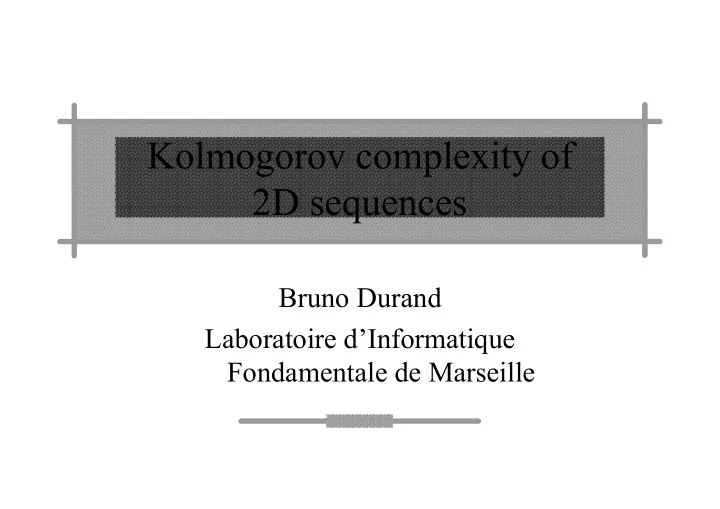

Kolmogorov complexity of 2D sequences Bruno Durand Laboratoire d’Informatique Fondamentale de Marseille
Kolmogorov complexity Goal: to measure the complexity of an individual object (Shannon) theory of information: measures the complexity of a random variable A theory of optimal compression “the size of the smallest program that generates the object”
Examples K( n ) < log( n ) + c K(2 n +17) < log( n ) + c K(x y ) < log( x ) + log( y ) + c K(x y |y ) < log( x ) + c Strings with low complexity are rare
Two theorems The set of prime numbers is infinite If K( x 0 , x 1 ,… x n | n ) < c, then x i is computable
Exemple of 2D infinite objects A finitary drawing
This infinite object is “simple” n x n squares have log( n ) complexity
Complex infinite objects Flip a coin for each cell No structure Theorem (Levin Schnorr 1971): random configurations have maximal complexity. The complexity of all their n x n- squares centered in (0,0) is n 2 .
Question of the day What is the complexity induced by a finite set of local constraints? Motivations: molecule arrangements, etc. Hilbert’s 18th problem Hilbert das Entscheidungsproblem
Tile sets Wang tiles Squares with colored borders Tiles with arrows Arrows and colors Polygons -- rational coordinates Correct arrangement ¸ No irrational coordinates (Penrose)
Wang tiles Squares of unit size Colored borders No rotations Finite number Matching colors
Example - Wang tiles
Periodic tiling obtained 2x4
Tiles with arrows Squares of unit size Arrows on borders Rotations allowed Finite number Arrows must match
Example - tiles with arrows
See something and…
…imagine more
Polygons -- rational coordinates Polygon on a grid Polygon simple No rotations Finite number Correct arrangement
Elementary example
And also…
Tiling of a region The matching constraint must be ok inside the region No constraint on the border Examples: n Tiling of a rectangle n Tiling of a half-plane n Tiling of the plane
Simulations These models are equivalent for tilability of a region. Some theory is needed here (skipped)
A more general model: Local constraints Planar configurations of 0’s and 1’s A configuration is a tiling if and only if • a local and uniform constraint is verified ß Local : neighborhood Uniform : same rule in each cell
Palettes A local constraint is a palette if and only if it can tile the plane (L. Levin) n Idem : Wang tiles n Idem : tiles with arrows n Idem : polygons
« computation - geometry » Decision problem : « domino problem » n Input : a local constraint T n Question : is T a palette ? This problem is undecidable (Berger 1966)
Break translational symmetry Nice configuration (little cheating…)
Still nicer : a carpet !
How to build such carpets…
How to express that Carpets can be produced by tilings or There exists a palette that produces carpets or In all tilings by a palette, carpets appear
Tilings enforced by a palette A set of configurations that is Shift invariant Compact
What we hope to enforce Let c be a configuration The set of configurations that contain the same finite patterns than c Id est :
The carpet is enforceable Possible proofs: Give explicitly a palette that enforces it 1. Give a construction method for such a palette 2. Prove that such a palette exists 3.
1. A palette that enforces carpets More or less…
2. Construction method: self-similarity of carpets Smallest squares are red and form a 2 steps grid Squares of same size are vertically and horizontally aligned In the center of a red square (resp. blue) lays a corner of a blue one (resp. red) Squares of same color are disjoined
3. Existence proof A configuration c is : of finite type if and only if there exists n such that of potentially finite type if and only if it can be « enriched » into a configuration of finite type.
Finite types and tilability A configuration is of potentially finite type if and only if it is enforced by a tiling. Theorem: the carpet is of potentially finite type. Constructive proof ( n =2)
Question of the day (bis) Consider all tilings obtained with a considered palette. How complex is the simplest one?
Theorems Undecidability of the « domino problem »… Applications in logics. (Berger 1966, Robinson 1971, Gurevich and Koriakov 1972) There exists a palette that produces only non-recursive tilings (Hanf and Myers 1974) Cannot be improved (Albert Muchnik) Complexity bound: Any palette can form at least a tiling in which squares of size n contain at most O( n ) bits of information. (BD, Leonid Levin and Alexander Shen 2001) There exists a palette s.t. for all tiling, any square of size n contains about n bits of information. (same paper - long version in preparation - ready November 2067) Checks that the infinite sequence is complex Extensions to configurations that tolerate tiling errors?
Complex tilings constructed Aperiodic tile sets Arecursive tile sets ( x,y ) Æ T( x,y ) Complex tilings: in all n x n -squares there are n bits of a random sequence (optimal)
Complexity lemma An infinite sequence x is uniformly c -random if and only if there exists N such that for all k > N for all i K( x i …x i+k ) > ck Lemma: For all c < 1 there exists a uniformly c -random sequence works for bi-infinite sequences - no arbitrary large subsequences of 0’s
Recommend
More recommend